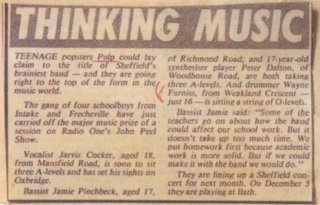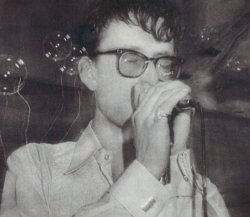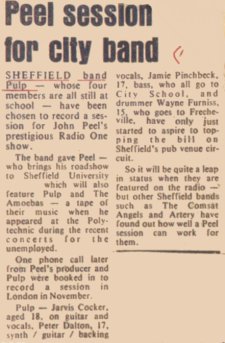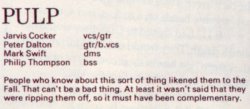
 "I Knew Them When They Were Nobody"
"I Knew Them When They Were Nobody""I used to do an interview every year with Jarvis.
Every time, he'd say, If we don't do it this year, we'll split up..."
It is 1978: Martin Lilliker hadn't been pop reported on The Sheffield Star for more than a few months when he chanced upon a schoolboy band, christened Arabicus Pulp but wisely dumping half of its name by the time of their classroom debut. Sheffield's bijou scene ensured word spread easily, and Pulp were approached by Record Mirror writer Marcus Featherby of Aardvark Records who was overseeing a local band compilation dubbed Bouquet Of Steel. He failed to find room on it for Pulp but Featherby included them in the accompanying booklet. "The music was very rudimentary," Cocker concurs, "We were trying to be pop but it was all a bit punkish."
According to Cocker, Featherby was "a strange character. He started taking us under his wing, which was good because we weren't even old enough to get into pubs. I don't think we'd have existed without him." Featherby sorted out Pulp's first public show, at Rotherham's Brian O'Malley Arts Centre, after which they joined the Sheffield circuit, playing venues like The Hallamshire pub, where Lilliker first clapped eyes on them. "They weren't that much different to the pop band they are now," Lilliker vouches, "though obviously less glossy. The musicmanship was pretty incompetent but the fact they had some great songs shone through. Sheffield's bands were of all different hues, from Comsat Angels to Caberet Voltaire, but Pulp stood out by virtue of Jarvis. He'd wear flying helmets, or strange furry hats, and his mannerisms were already there. He'd chat between numbers, about stuff like the Blackpool amusements. He had a tremendous rapport with the audience, like they were sitting in his front room."

Lilliker's successor on The Star, John Quinn, remembers, "This ugly, tall singer, who was hilarious, putting on a mock-sincere voice, saying This is for my girlfriend who left me alone in the room over the front garage. Someone threw a wet toilet roll at one point, and it hit Jarvis in the face. A lot of singers would be upset but he just laughed." He didn't always. Cocker's bespectacled gangliness encouraged heckles and at one show at The George IV, Lilliker remembers Jarvis running off stage, crying. "He hid under a table. I don't think people realised he was sensitive, despite his persona, and could take things to heart. Jarvis always wanted to be taken seriously."

Nevertheless, John Peel was an early champion, booking Pulp for a session after Jarvis had given the DJ their first demo at a Sheffield roadshow. Local hero status was theirs when The Star stuck a Pulp photo and caption on the cover. Though the band resisted attempts to get them to pose in school uniforms, crummy tank tops and bad hats were evidently OK, "At the time, we were the most precocious people around in Sheffield," Cocker ventures. "To think I was once a child star, and now this clapped-out old thing."
The Peel session led to another appearance on a compilation, Statik Records' Your Secret's Safe With Us. However, Statik, like Aardvark, took no further interest in them. But Tony Perrin, manager of Sheffield art-pop oddities Artery (and later, the Mission and All About Eve), felt differently; he instantly wanted to manage Pulp after seeing them play, and even stumped up the budget for a mii-album. "From their first song, I thought Jarvis was a star," Perrin claims. "He acted exactly as he does today, though it's weird to see him perceived as this major league sex smbol because he was this awkward, non-sexual kid. The music was snappy three-minute pop songs, probably closer to the way they sound now than some of the configurations they went through."
The April, 1983-released It, "got slagged to death," Perrin admits, and sold a paltry 300 copies. "Pulp had gone more acoustic by this point, and it got compared to Everything But The Girl. They were suddenly the most uncredible band in the world as far as the press were concerned, this fey, whimsical outfit from up North with a crap name. You needed to see them live to get what they were about but they didn't have the profile to get the press out to see them."
Through failed record company liasons, mutiple line-up changes and periods where, as Cocker recalls, "life moved at snail's pace with lots of time in between to contemplate its horrors." But national overdecade sensationhood was theirs in the end. The last time Lilliker met Cocker, at Sheffield Arena this year," he was trying to get away from a milling crowd of fans. I wasn't envious of him at all."
Below: Pulp's scant showing in Featherby's Bouquet of Steel booklet
